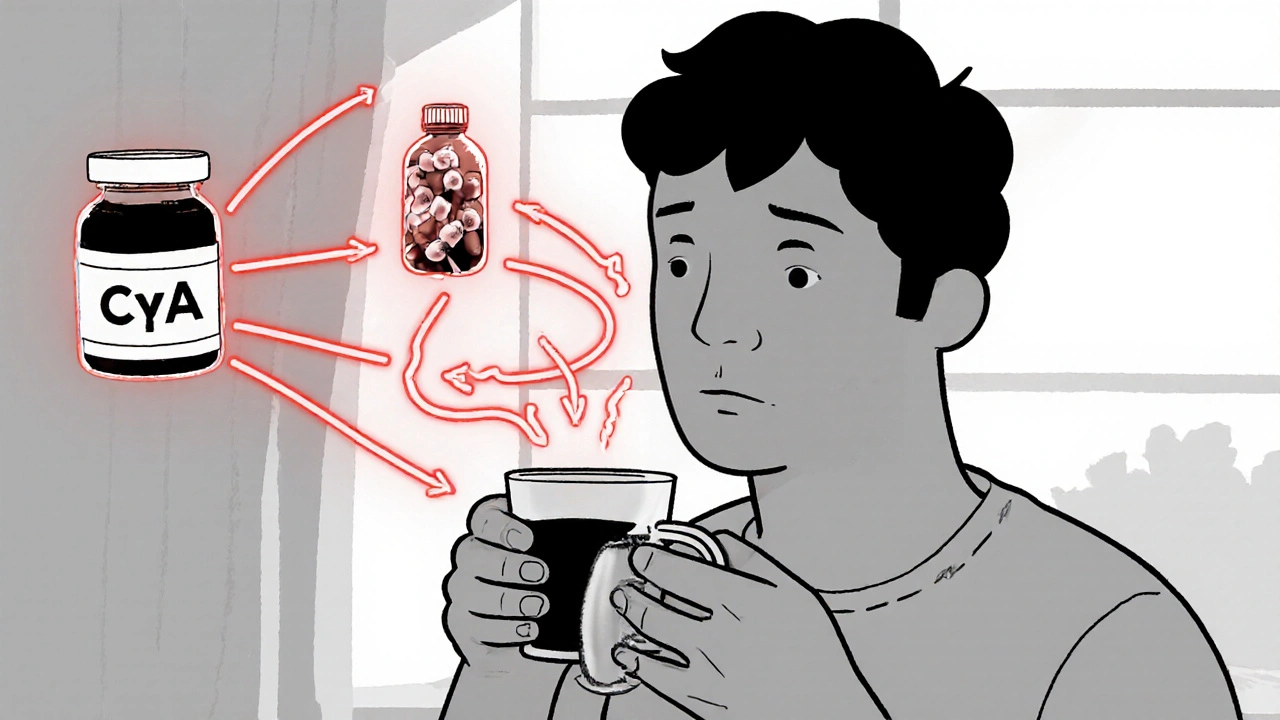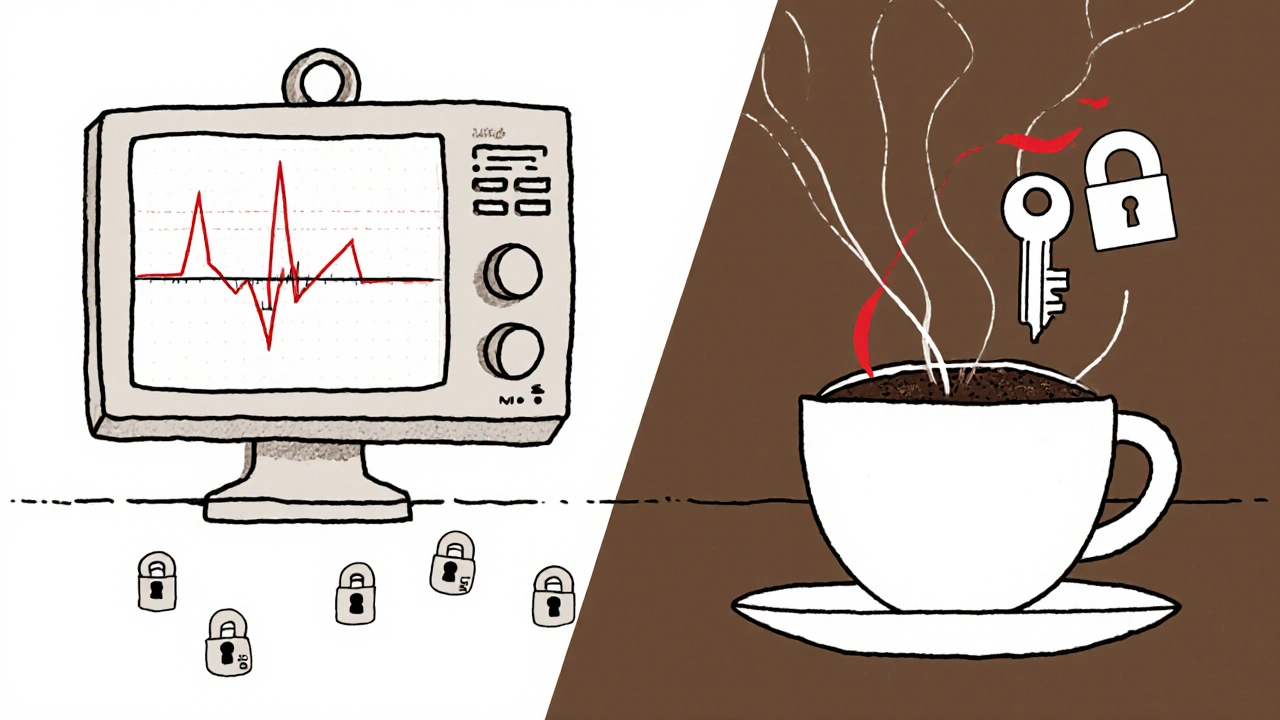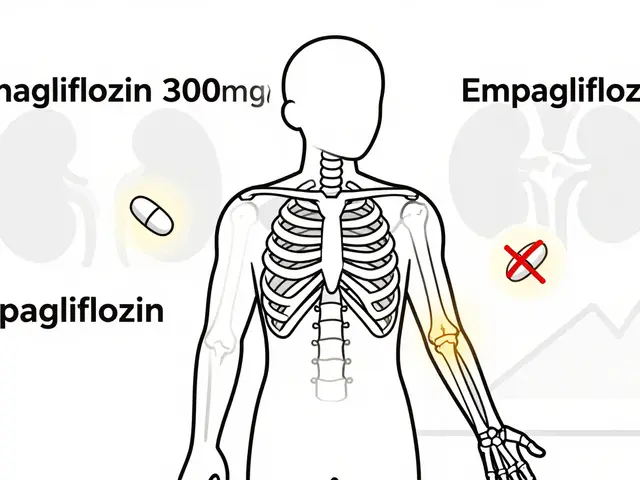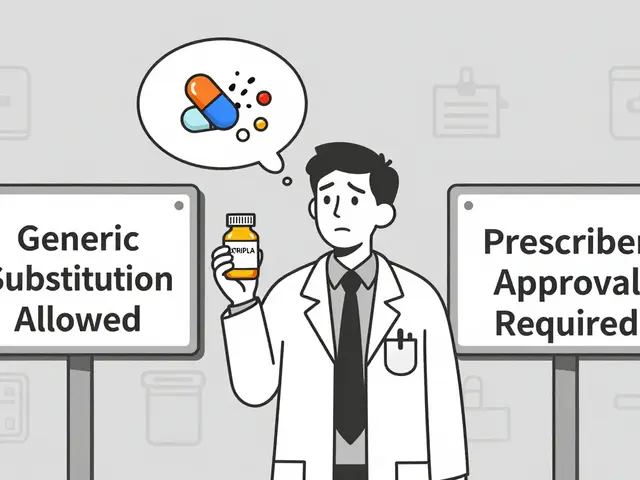
Caffeine Medication Interaction Checker
Select Your Medication
What Happens When Caffeine Meets Your Medication?
You drink your morning coffee without thinking. Your pills are right there on the counter. You take them together. It’s quick, it’s routine. But what you might not realize is that this simple habit could be making your medication less effective-or worse, pushing your body into dangerous territory.
Caffeine isn’t just a wake-up call. It’s a powerful chemical that interacts directly with how your body processes many common drugs. These aren’t rare edge cases. They’re everyday risks that affect millions. The American Heart Association reports that caffeine-medication interactions contribute to nearly 3% of all adverse drug events in adults over 50. And nearly 40% of those cases land people in the emergency room.
Why Coffee Interferes With Your Pills
Caffeine’s main weapon is its effect on a liver enzyme called CYP1A2. This enzyme breaks down about 10-15% of all prescription drugs. When you drink coffee, caffeine blocks this enzyme. That means drugs don’t get cleared from your body as quickly. They build up. Too much can lead to toxicity.
But caffeine doesn’t just slow things down. It also acts like a fake key in your body’s lock system. It blocks adenosine receptors-the same ones targeted by heart medications like adenosine and dipyridamole. That’s why doctors require you to avoid caffeine for 24 hours before a cardiac stress test. One cup of coffee can make the test useless.
Medications That Become Dangerous With Caffeine
- Warfarin (Coumadin): Caffeine slows down how fast your body breaks down warfarin. This can push your INR levels up by 15-25% within a day. Higher INR means thinner blood-and a higher risk of dangerous bleeding. The American Heart Association advises warfarin users to keep caffeine intake under 200 mg daily (about two cups of coffee) and to drink the same amount every day. Sudden changes can cause dangerous swings.
- Levothyroxine (Synthroid): Coffee doesn’t just interfere with absorption-it cuts it by 25-57%. A 2017 study of 98 patients showed that those who drank coffee within an hour of taking their thyroid pill had TSH levels nearly double those who waited. One Reddit user reported their TSH jumped from 1.8 to 4.5 after years of stability-until they started waiting 60 minutes after their pill. That’s the difference between feeling fine and feeling exhausted, gaining weight, and struggling with depression.
- Antidepressants: Fluvoxamine (Luvox) and escitalopram (Lexapro) are particularly sensitive. Harvard Health found caffeine reduces their absorption by about 33%. Meanwhile, amitriptyline and imipramine build up in the bloodstream by 20-40% when taken with coffee. That’s why so many people report extreme anxiety, jitteriness, or trouble sleeping. One Drugs.com review found 68% of psychiatric medication users noticed worse anxiety when combining caffeine with their pills.
- Seizure Medications: Carbamazepine, phenytoin, valproate, and others become less effective when paired with caffeine. A 2019 study in Epilepsy & Behavior found patients on these drugs had 18-35% more seizures if they consumed caffeine regularly. For someone with epilepsy, that’s not just inconvenient-it’s life-threatening.
- Stimulants: Adderall, Ritalin, pseudoephedrine, and even over-the-counter cold pills become far more intense with caffeine. University Hospitals reported heart rates spiking 20-35 beats per minute and systolic blood pressure rising 15-25 mmHg within 45 minutes. People describe feeling like their chest is going to explode. One ADHD user on PatientsLikeMe said they couldn’t sleep for 12 hours after taking Adderall with coffee.
- Blood Pressure Medications: Verapamil and similar drugs lose some of their power when caffeine is in the system. Mayo Clinic found diastolic blood pressure readings stayed 8-12 mmHg higher for 2-3 hours after coffee. For someone trying to control hypertension, that’s a setback.
- Diabetes Medications + Pseudoephedrine: This combo is a hidden trap. Pseudoephedrine (found in many cold meds) raises blood sugar. Add caffeine, and the effect multiplies. University Hospitals found diabetic patients saw blood sugar spikes of 15-25 mg/dL and body temperatures rise 0.5-1.0°C. That’s enough to throw insulin dosing off track.
What About Aspirin and Caffeine?
You’ll find aspirin-caffeine combos in pain relievers like Excedrin. Mayo Clinic says they’re generally safe. But European studies suggest high doses of caffeine with aspirin may increase stomach bleeding risk. If you’re on blood thinners or have a history of ulcers, it’s not worth the gamble. Stick to plain aspirin or acetaminophen.

How to Stay Safe: Timing Matters
It’s not always about quitting coffee. It’s about when you drink it.
- Thyroid meds: Wait at least 30-60 minutes after taking levothyroxine before drinking coffee. Some experts recommend waiting 2 hours for maximum absorption.
- Antidepressants: Take your pill at night if possible, or at least 2 hours before or after your morning coffee.
- Warfarin: Stick to one or two cups a day, and don’t change your routine. A sudden increase or decrease can throw your INR out of range.
- Cardiac stress tests: No caffeine for 24 hours. Not even tea, soda, or chocolate. That includes decaf-yes, it still has 2-15 mg of caffeine.
- Pseudoephedrine: Avoid caffeine for 4-6 hours after taking cold meds. That includes energy drinks, pre-workout powders, and even dark chocolate.
- Seizure meds: If you’re on carbamazepine or phenytoin, talk to your neurologist about eliminating caffeine entirely.
Decaf Isn’t Safe Either
Many people think switching to decaf solves the problem. It doesn’t. A cup of decaf coffee still contains 2-15 mg of caffeine. For someone on warfarin or levothyroxine, that’s enough to cause measurable effects. If you’re highly sensitive, even one decaf cup a day could be problematic.
What Are the Warning Signs?
If you’re taking medication and drinking caffeine, watch for these red flags:
- Heart rate over 120 beats per minute
- Systolic blood pressure above 180 mmHg
- Difficulty breathing or chest tightness
- Vision changes, confusion, or loss of coordination
- Twitching, rigid muscles, or severe shaking
- Sudden worsening of depression or suicidal thoughts
- Seizures or altered mental state
If you experience any of these, seek medical help immediately. These aren’t side effects you can sleep off. They’re signs your body is being overwhelmed.
Why This Isn’t Just a ‘Maybe’
There are 150 million Americans who take medication and drink caffeine daily. That’s more than half the adult population. The American Pharmacists Association estimates these interactions cost the healthcare system $1.2 billion a year in preventable ER visits, lab tests, and hospitalizations.
And it’s getting worse. The FDA added caffeine interaction warnings to 15 new drugs in 2024. Drug databases now flag 127 medications for caffeine risk-up from 89 in 2020. Hospitals are now automatically flagging caffeine use in electronic health records. This isn’t theoretical. It’s clinical policy.
What’s Next?
Researchers are now looking at genetic testing to find people who metabolize caffeine slowly-those with CYP1A2 gene variants. These individuals are at far higher risk. In the future, your pharmacist might check your DNA before you even fill a prescription.
Apps are also being developed to scan your medication list and alert you if caffeine could be dangerous. But for now, the simplest solution is still the best: talk to your doctor or pharmacist. Ask: ‘Does my medication interact with caffeine?’ Don’t assume it’s safe. Don’t assume it’s not.
Final Thought: It’s Not About Giving Up Coffee
You don’t need to quit coffee. You just need to respect it. Think of caffeine like a wild animal-it’s not evil. But if you don’t understand how it behaves, you’ll get hurt. Adjust your timing. Know your meds. Listen to your body. And if you’re unsure? Wait. It’s better to be safe than sorry.




14 Comments
I never realized decaf could still mess with my thyroid meds. I switched to it thinking I was being smart. Turns out I was just being dumb. Now I wait two hours after my pill before even touching a cup. Life's better now.
This is the kind of post that makes me love the internet. So many of us just wing it with meds and coffee like it's no big deal. But this? This is real life stuff. Thank you for laying it out like this. 🙌
I used to take Adderall with my morning joe and wonder why I felt like my heart was gonna burst 😅 Now I wait 3 hours. Still get my buzz. Still get my focus. Just not the near-death experience.
People need to stop blaming coffee. It's not the caffeine. It's your body being weak. If you can't handle a little stimulant with your meds you probably shouldn't be on meds at all.
I'm a nurse and I see this all the time. Patients come in with crazy INR spikes and swear they 'only had one cup.' One cup is all it takes. Please listen to the science. Your pharmacist isn't trying to ruin your day.
If you're on warfarin and you drink coffee like it's water you're playing Russian roulette with your insides. I lost my uncle to a brain bleed because he thought 'it was just coffee.' Don't be him.
Wow. So caffeine blocks CYP1A2. And that's why my Lexapro stopped working after I started drinking cold brew. Guess I'm not special. Just a walking pharmacology textbook.
The scientific literature is unequivocal regarding the pharmacokinetic interference of methylxanthines with hepatic cytochrome P450 isoenzymes, particularly CYP1A2, thereby altering the clearance of numerous pharmaceutical agents including but not limited to anticoagulants, antiepileptics, and psychotropics. One must exercise extreme diligence in temporal separation of ingestion.
I don't care what some study says. Coffee is American. Medications are just suggestions. If you can't handle your own body then maybe you shouldn't be living here.
This is all a lie. The FDA doesn't care about you. Big Pharma wants you to believe coffee is dangerous so they can sell you $200 'caffeine-free' versions of your meds. Wake up.
I've been waiting 60 minutes after my Synthroid for 3 years... and my TSH is STILL 3.8. So maybe it's not the coffee? Maybe it's the water? Maybe it's the air? Maybe it's the government? I need a new doctor.
Caffeine as a pharmacological agent represents a paradoxical interface between cultural ritual and molecular antagonism. The human organism, in its evolutionary naivete, has domesticated this alkaloid without comprehending its ontological disruption of endogenous adenosine signaling pathways. We are not merely consuming a beverage-we are negotiating a biochemical coup.
Just wait 30 minutes. That's it. Don't overthink it. Your body will thank you. I used to be the guy who drank coffee while swallowing pills. Now I just sit quietly for half an hour. Feels like a mini meditation. And my anxiety? Gone.
They're hiding the truth. Caffeine isn't the problem. It's the glyphosate in the coffee beans that's altering your liver enzymes. And the government knows it. That's why they don't warn you. They're protecting the agrochemical industry.